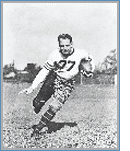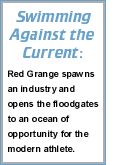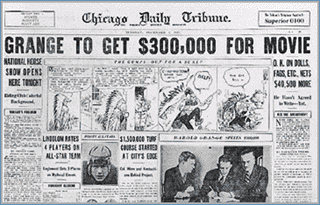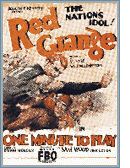
|
By Michael Fresina
Red grange was the first athlete to really market himself, a move that still pays off for
today's pros.
|

|
Tim Couch couldn't have known it at the time, but when the star quarterback from Kentucky and the NFL's top draft pick signed a deal with the Cleveland Browns that will pay him as much as $59.4 million over the next seven years, a ghost was in the room with him, hovering approvingly nearby.
If Couch and the rest of this year's crop of newly minted NFL millionaires owe a debt of gratitude for the riches they're about to reap, it's not just to their coaches and agents. Red Grange also deserves to be thanked.
Grange, the "Galloping Ghost" of University of Illinois football lore, was the first big-time American athlete to have the foresight to recognize his own marketablility. He also had the desire, willingness and ability to maximize his exposure and, with it, his income. As an entrepreneur, Grange directly shaped the lives of today's professional athletes.
And all this at a time when the term "sports agent" - not to mention the function it implies had yet to be invented.
When Grange graduated from Illinois, he was the most exciting and recognizable athlete in the country. Today, he would be taken as the first overall pick in the draft. In 1925, however, professional football was the redheaded stepchild to the college game. Still, Grange thought he deserved pay for play, and he had the common sense to know that he needed help if he was to get top dollar.
|

|
|
So he hired an agent, C.C. Pyle, to negotiate an elaborate contract with the Chicago Bears. So it was that, after his last game for Illinois, Grange, in disguise, boarded a train to Chicago to begin barnstorming with the Bears.
The contract Pyle negotiated paid Grange more than $3,000 a game and a share of the gate this at a time when the schedule consisted of a grueling nine games in 66 days. The money Grange was making an unheard of amount for a professional football player in those days brought credibility to the pros. Professional football quickly became the dream and next logical step for college standouts.
It was not the first time Grange helped lead the game into a new financial era.
When Grange arrived as a freshman at the University of Illinois in 1923 he had no intention of playing football. It was not until he was told to play by a group of senior fraternity brothers that he considered trying out. After one day, he decided to quit, but those same frat brothers' wooden paddles convinced him to give it another shot. While leading the Illini to a consensus national championship and dominating what would become the Big Ten, Grange never earned an athletic scholarship. None of his Illini teammates did.
|

|

Athletic scholarships were unheard of in the Œ20s. To earn tuition money, Grange returned to Wheaton every vacation to haul ice. He became known as the "Wheaton Iceman," gaining notoriety for single-handedly carrying loads that pairs of men could not manage. The press energetically recorded his efforts. While his football exploits made him a superstar, the "Wheaton Iceman" accentuated the need for athletic scholarships in exchange for the attention and revenue garnered by schools' athletic programs. Citing Grange as an inspiration, many schools began offering athletic scholarships.
|

|
As a senior, Grange was the most exciting and recognizable athlete in the country. Today, he would be taken as the first overall pick in the draft. In 1925, however, professional football was the redheaded stepchild to the college game. Grange had the common sense to appreciate the idea of getting paid to play a game.
Nike and Budweiser did not form a partnership under the cover of night and invent athlete endorsements. Marquee athletes have been endorsing products since companies realized that people want what their heroes like and use. During his career, Grange inked contracts with candy, soft drink, and appliance companies. He even graced packages of his own Galloping Ghost Meatloaf. Acutely aware of his own marketability, Grange made his way to Hollywood, starring in two silent movie features.
Modern sports are the sum total of all that came before. Today's professional athletes indeed owe a debt of gratitude to that first pioneer who believed he could beat his friend, in what he didn't know was a race, to a point on the horizon. When he later arranged a re-match and talked friends into paying to watch, an industry was born.
Michael Fresina is on the staff at Pro.
|
|
|

|
|

